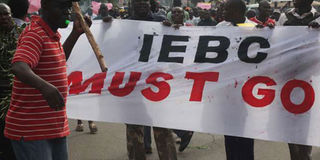Row raises queries on disregard of electoral process

Kisumu town residents demonstrate on April 26, 2016 demanding the removal of Independent Electoral and Boundaries Commission. Electoral commissions are only responsible for a small part of the electoral process. Elections fail in many ways and, quite often, long before voting day. PHOTO | TOM OTIENO | NATION MEDIA GROUP
What you need to know:
- Failure to agree on who runs the elections, therefore, is the effect of failing to agree on the ground rules of political competition, not the cause of flawed elections.
- The protest against the IEBC, set against the contested outcome of the 2013 election and the lack of deep reforms since, was always a riot waiting to happen.
Elections in western-style democracies, in which power is divided between an effective Executive, an honest Judiciary and an elected Parliament, are primarily about the choice of leaders.
Elections in emerging democracies, particularly in Africa, serve as a stress test of the growth and capacity of these and other state institutions.
The current fight over the integrity of the Independent Elections and Boundaries Commission (IEBC) in Kenya ahead of the 2017 election isn’t entirely surprising, but is a symptom of a bigger problem — the integrity of the electoral process and its chief arbiter.
Questions about the composition and integrity of electoral commissions are not unique to Kenya.
In Uganda, the failure to reform the Electoral Commission as proposed by opposition groups and civil society and as advised by the Supreme Court in 2001 and 2006 is one of the main reasons for the widespread disquiet over the 2016 elections.
But electoral commissions are only responsible for a small part of the electoral process. Elections fail in many ways and, quite often, long before voting day.
The Electoral Integrity Project (EIP), a think tank that provides an independent evaluation of the quality of elections worldwide, lists a number of ways.
They include: lifting of term limits; laws restricting pluralistic political activity; arrests, intimidation and jailing of political rivals; inaccurate voters registers; vote-buying and ballot-stuffing; unfair access to public media; bias by electoral commission officials; and failed dispute resolution mechanisms.
With a few exceptions, many of these failures are beyond the remit of the electoral commission, and are not even necessarily curable by a truly independent EC.
Failure to agree on who runs the elections, therefore, is the effect of failing to agree on the ground rules of political competition, not the cause of flawed elections.
Over the past year or so, several African countries have held presidential and parliamentary elections.
In Burundi and the Republic of Congo, where presidents Pierre Nkurunziza and Dennis Sassou Nguesso removed or ignored term limits, violence broke out.
In Niger and Zanzibar, the opposition called for boycotts citing widespread fraud, while elections in Ethiopia, Mozambique and Uganda were widely discredited by independent observers.
Yet many African countries now routinely hold free and fair elections, including Mauritius, South Africa, Lesotho, Cape Verde, Namibia, and even Benin.
SLIPPERY SLOPE
Pippa Norris, an election analyst at Harvard University and one of the founders of EIP, says many factors contribute to these contrasts in African elections, including a history of war and violence, a natural resources curse, flawed constitutional designs (for instance that cement a winner-takes-it-all outcome in polarised societies), ethnic divisions and the examples served up by neighbours.
The protest against the IEBC, set against the contested outcome of the 2013 election and the lack of deep reforms since, was always a riot waiting to happen.
Some have wondered why Kenya was able to hold a fairly credible election in 2002 in which Mwai Kibaki, a joint opposition candidate defeated Uhuru Kenyatta, the candidate favoured by the retiring President Moi, but has had disputed elections since.
In a study of 135 autocratic and democratic regimes from 1950 and 1990, political scientists Adam Przeworski and Fernando Limongi argued that new democracies were likely to slip back into dictatorship or unrest unless per capita incomes rose to about $8,000 per person in 2005 prices.
This backsliding has been seen in Mali, in Mozambique, in Zambia and could be the treacherous slope on which Kenya seems to be walking.
When the politics doesn’t work for all and when political reform doesn’t bring a clear economic dividend to ordinary people across the board, the political space is contested afresh, sometimes violently, and sometimes out of the bedrock of ethnic support.
The IEBC is an easy target for a fight that is as much about the integrity of the electoral process as it is about the political question in Kenya.
The IEBC can only work if the rest of Kenya is working.





